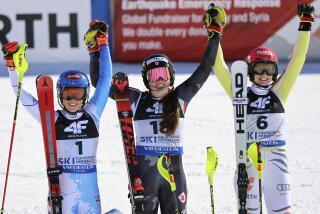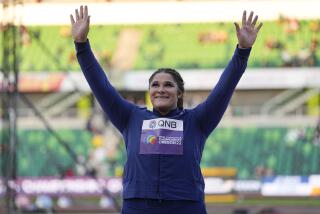Canadian Wins Pursuit of Medal
- Share via
MIDWAY, Utah — In a place with all that snow, you would think someone would have cross-country skied faster in 78 years. On a day at Soldier Hollow when the sport never seemed more exciting, Beckie Scott, 27, of Canmore, Canada, not only did something no other Canadian has done, but by earning an Olympic bronze medal in Friday’s women’s pursuit, she won only the second cross-country skiing medal ever by a North American. And in a photo finish too.
The only other time any skier from Canada or the United States won a medal was 1976, when American Bill Koch took silver in the 30k.
Scott’s American connections go deeper than that--her boyfriend is U.S. Olympian Justin Wadsworth, and she and Canadian teammates trained extensively here to get used to the 5,600-foot altitude on the hilly course.
“We decided we’re not going to be mediocre anymore,” Scott said. “I’m comfortable with the altitude. I’m comfortable with the terrain.”
And now she’s comfortable with the awards podium.
The setting and racing were spectacular before 13,406 fans on another sun-splashed day that makes the 2002 Winter Olympics seem more like a spring Olympics. It was no surprise that Russian women, Olga Danilova, 31, and Larissa Lazutina, 36, took gold and silver, respectively, though Lazutina, who won her ninth Olympic medal, had been a better bet.
To say that North American cross-country fans had never seen anything like this was true in more than one sense. Crowds such as this--screaming and swinging cowbells--are unprecedented outside Europe.
“On the last hill, everyone was chanting, ‘Nina! Nina!’” said top American Nina Kemppel, who placed 27th.
The pursuit itself is a little-known discipline. At 9 a.m., 73 starters left the stadium at 30-second intervals to ski five kilometers in classical style over a rugged course. The top 50 finishers then had less than two hours’ rest before skiing five kilometers in the skate style. This time they left in bunches, in the order of the morning result, separated by their finish times. A full-fledged chase.
Fans couldn’t cheer fast enough when names were announced. The World Cup circuit is planning an experimental pursuit in Sweden in a couple of weeks, eliminating the rest period altogether. Racers will finish, change boots from classical to skate style, and take off.
“Duathlon style,” Kemppel said. “I’m all for it. Let’s make it even more exciting.”
All four Americans who raced--Kemppel, Wendy Wagner, Aelin Peterson and Kikkan Randall--are from Alaska, making the sparsely populated state a country unto itself Friday. Only Kemppel and Wagner (50th) advanced to the final.
Soldier Hollow is picturesque, located in a bowl in the Wasatch Mountains, but it is not benign terrain. “It’s one of the most challenging courses I’ve seen,” Wagner said. “There are other courses comparable, but they’re at sea level.”
Danilova and Lazutina finished the first 5k in a virtual dead heat. Scott was sixth. But the Russians broke from the pack on the hills in the second race. Lazutina, who called the pursuit “the most difficult” cross-country race, tried to shadow Danilova, another accomplished veteran. Danilova said she was trying to conserve strength, but approaching the stadium, knew “I had to risk it.” She opened daylight on Lazutina and won in a combined time of 24 minutes, 52.1 seconds, 6.9 seconds ahead of Lazutina.
Scott, whose best finish in four individual events in the 1998 Games in Nagano was 45th, approached the finish in a pack of seven. She dug deepest. In the mad sprint for the line, she edged Katerina Neumannova of the Czech Republic by 0.1, and less than seven seconds separated bronze from ninth place.
“This has been 10 years in the making,” Scott said. “It means so much for our sport and our country. I’d like to think a lot of people can share in this medal. It means the world.”
And Friday, the world was watching.
More to Read
Go beyond the scoreboard
Get the latest on L.A.'s teams in the daily Sports Report newsletter.
You may occasionally receive promotional content from the Los Angeles Times.







